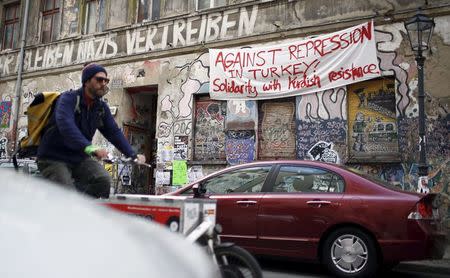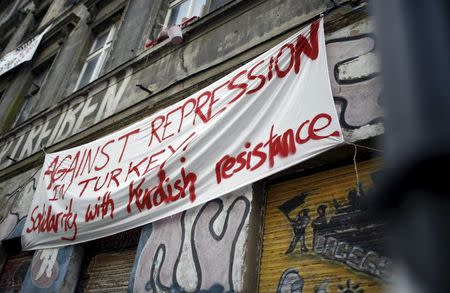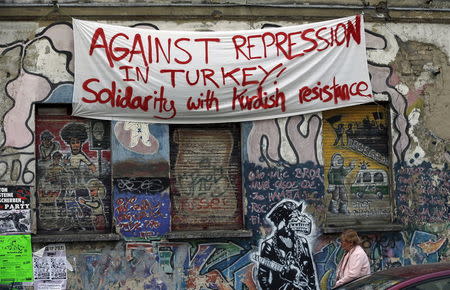Germany fears return of Turkish-Kurdish violence on its soil
By Noah Barkin BERLIN (Reuters) - As Germany scrambles to contain a diplomatic row with Turkey over a comedian's mocking of President Tayyip Erdogan, officials are growing worried about another byproduct of their Faustian migrant pact with Ankara: an upsurge in violence between nationalist Turks and militant Kurds on German soil. Germany is home to about 3 million people of Turkish origin. Roughly one in four are ethnic Kurds who came to Germany to work in the 1960s and 70s, or as refugees fleeing violence in the 1980s and 90s. Intelligence officials estimate that about 14,000 of these Kurds are active supporters of the Kurdistan Workers Party (PKK), the militant group whose armed struggle against the Turkish state has escalated following the collapse of a 2-1/2 year ceasefire last July. Clashes between Turks and Kurds in Germany are not new. At the height of the conflict between Ankara and the PKK in the early 1990s, Kurdish militants overran the Turkish consulate in Munich and launched arson attacks against Turkish facilities across Germany. This led Germany to outlaw the PKK in 1993. But the combination of rising violence in Turkey and Chancellor Angela Merkel's controversial refugee deal with Ankara has raised the risk of a new wave of clashes, government and intelligence officials worry. "When you have a full blown civil war there, then there is the risk of direct transmission to German cities," said a senior German diplomat on condition of anonymity. "This is the other side of Merkel's refugee deal. It makes it all the more difficult to manage." CLASHES IN BAVARIA On Easter Sunday in the Bavarian city of Aschaffenburg, roughly three dozen Kurds threw rocks and shot fireworks at a group of 600 Turks demonstrating against the "terror" of both Islamic State and the PKK. The Kurds barricaded themselves in a cultural center, attacking police from the roof, before reinforcements arrived and the offenders were arrested. Bavarian Interior Minister Joachim Herrmann said the incident showed the dangers of offering Turks visa-free travel, a key plank of the European Union's migrant deal with Ankara that Merkel has championed in the face of deep scepticism at home and elsewhere in the bloc. Last Sunday, more Turkish demonstrations were held in cities across Germany, although this time only minor scuffles were reported thanks to the deployment of thousands of police. "There was a time in the 1990s when you had serious clashes in Germany," said Kristian Brakel, a Turkey expert at the German Council on Foreign Relations in Berlin. "It is not unlikely that this sort of thing could happen again." An internal report from the Berlin branch of Germany's domestic intelligence agency echoes that sentiment, warning of an "emotionally charged" mood among PKK supporters in Germany, in part because they view the EU's migrant deal with Turkey as a form of "collaboration" with their arch-enemy Erdogan. "Against this backdrop we cannot exclude militant acts in Berlin over the course of 2016, especially by younger PKK activists, against Turkish facilities," says the report, which was seen by Reuters. Kurdish organizations in Germany have denounced the Turkish demonstrations as a show of power by Erdogan and called on supporters to rally against them. "These are not demonstrations against the PKK and IS as advertised in German, but rather serve pan-Turkish ideologies and promote hatred of Kurds and non-Turks," a group of organizations representing Kurds, Armenians, Yazidis and others said in a statement last week. BALANCING ACT The conflict is another conundrum for Merkel, whose political future may ride on Erdogan delivering on his end of the migrant deal, under which Ankara has agreed to take back refugees from Greece in exchange for billions of euros, visa-free travel for Turks and accelerated talks on EU membership. Merkel faced strong criticism in Germany this week for condemning a sexually-explicit satirical poem about Erdogan by comedian Jan Boehmermann as "deliberately insulting" instead of defending the principle of free speech. As Berlin works to keep Turkey on side, it is also providing arms to Iraqi Kurdish security forces in the fight against Islamic State militants in their country. And many German politicians, especially in the far-left Linke and Greens parties, are active supporters of the very Kurds that Erdogan is vowing to crush. This has forced the German political establishment into an awkward balancing act. This week, Bundestag President Norbert Lammert, a member of Merkel's conservative party, and Foreign Minister Frank-Walter Steinmeier hosted Selahattin Demirtas, a leader of Turkey's pro-Kurdish Peoples' Democratic Party. (HDP) While Demirtas was in Berlin for the talks, the Turkish government was submitting a draft proposal to parliament that could strip HDP lawmakers of immunity from prosecution. Erdogan has accused the HDP of being an extension of the PKK. "Berlin has a lot riding on this Turkey deal," the German diplomat said. "But there is plenty that can go wrong." (Reporting by Noah Barkin; editing by Peter Graff)




